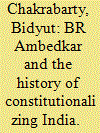| Srl | Item |
| 1 |
ID:
147382


|
|
|
|
|
| Summary/Abstract |
BR Ambedkar is usually projected as a protagonist of social justice. But equally important was his role in constitutionalizing India, evident first in his witness to the 1919 Southborough Committee on Franchise, followed by his intervention in the 1930 Round Table Conference in London, where he defended compensatory discrimination for the untouchables in opposition to the Gandhi. The article argues that in so doing Ambedkar was evidently influenced by his teacher at the University of Columbia, John Dewey, who taught him the finer principles of liberalism. By comparing the views of Gandhi and Ambedkar on separate electorates and reservation, the article pursues the argument that unlike the former, Babasaheb sought to transform society through politics which, to him, meant the consolidation of constitutional values or endosmosis, or, to borrow George Grote’s expression, constitutional morality. On the basis of a thorough analysis of the principal arguments that he made to defend constitutional protection for compensatory discrimination, this article provides valuable insights showing the analytical basis of Babasaheb’s notion of social justice. Furthermore, his defence of liberal constitutional values also laid the foundation of a unique moral and political framework for public reasoning, a contribution that has not been adequately recognized in contemporary scholarship on Dalits, BR Ambedkar or social discrimination.
|
|
|
|
|
|
|
|
|
|
|
|
|
|
|
|
| 2 |
ID:
191066


|
|
|
|
|
| Summary/Abstract |
The paper describes caste contestations around the Bhutaradhane tradition in the Tulunadu region of coastal Karnataka. Bhutaradhane is a pantheistic tradition of spirit worship which has been a key site for the assertion of regional identity claims in Tulunadu. The Bhutas (spirits) are ranked along a graded hierarchy that reflects the caste structure of the region. Drawing on ethnographic fieldwork, the paper describes the interventions of a Dalit caste, the Mundalas, to rupture this hierarchical structure and challenge their low assigned status in the tradition and in society. It explores how they draw on narratives of the past to appropriate and reshape the Bhutaradhane tradition in line with their aspirations for upward mobility. The paper situates current contestations around the caste’s patron Bhuta within the growing socio-political consciousness of the Mundalas, who have challenged the hegemonic discourse of Bhuta heritage, laying bare the operations of caste within the ritual as well as caste inequalities and exclusions in the region.
|
|
|
|
|
|
|
|
|
|
|
|
|
|
|
|